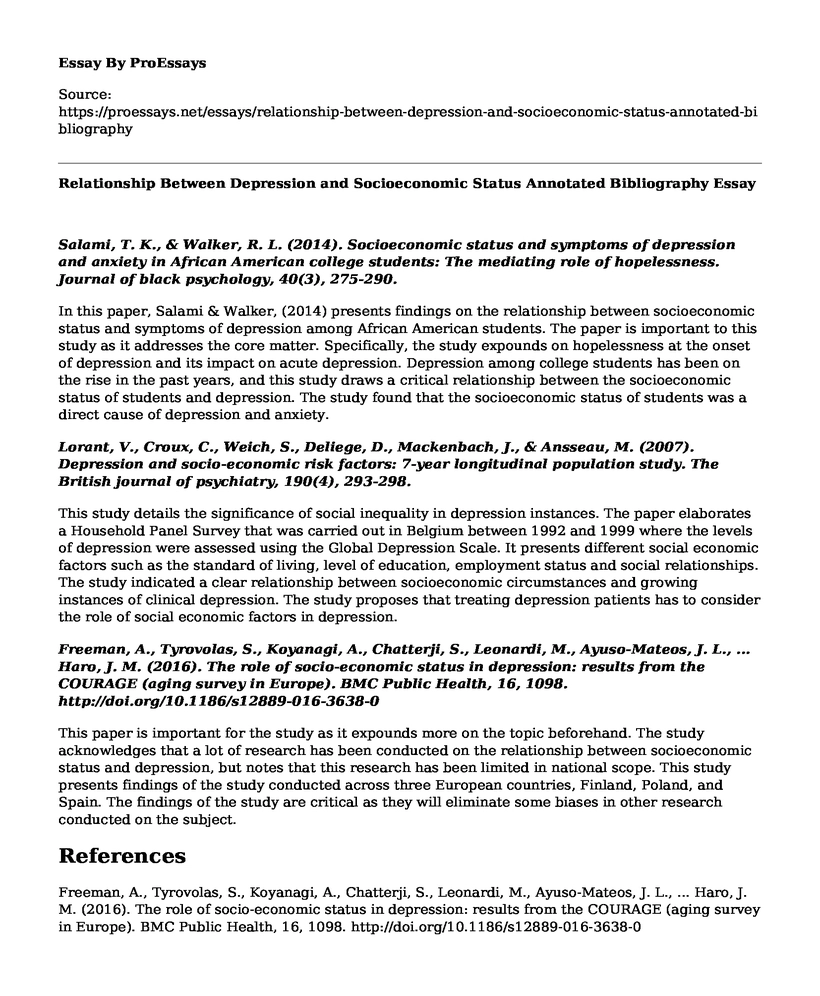Salami, T. K., & Walker, R. L. (2014). Socioeconomic status and symptoms of depression and anxiety in African American college students: The mediating role of hopelessness. Journal of black psychology, 40(3), 275-290.
In this paper, Salami & Walker, (2014) presents findings on the relationship between socioeconomic status and symptoms of depression among African American students. The paper is important to this study as it addresses the core matter. Specifically, the study expounds on hopelessness at the onset of depression and its impact on acute depression. Depression among college students has been on the rise in the past years, and this study draws a critical relationship between the socioeconomic status of students and depression. The study found that the socioeconomic status of students was a direct cause of depression and anxiety.
Lorant, V., Croux, C., Weich, S., Deliege, D., Mackenbach, J., & Ansseau, M. (2007). Depression and socio-economic risk factors: 7-year longitudinal population study. The British journal of psychiatry, 190(4), 293-298.
This study details the significance of social inequality in depression instances. The paper elaborates a Household Panel Survey that was carried out in Belgium between 1992 and 1999 where the levels of depression were assessed using the Global Depression Scale. It presents different social economic factors such as the standard of living, level of education, employment status and social relationships. The study indicated a clear relationship between socioeconomic circumstances and growing instances of clinical depression. The study proposes that treating depression patients has to consider the role of social economic factors in depression.
Freeman, A., Tyrovolas, S., Koyanagi, A., Chatterji, S., Leonardi, M., Ayuso-Mateos, J. L., ... Haro, J. M. (2016). The role of socio-economic status in depression: results from the COURAGE (aging survey in Europe). BMC Public Health, 16, 1098. http://doi.org/10.1186/s12889-016-3638-0
This paper is important for the study as it expounds more on the topic beforehand. The study acknowledges that a lot of research has been conducted on the relationship between socioeconomic status and depression, but notes that this research has been limited in national scope. This study presents findings of the study conducted across three European countries, Finland, Poland, and Spain. The findings of the study are critical as they will eliminate some biases in other research conducted on the subject.
References
Freeman, A., Tyrovolas, S., Koyanagi, A., Chatterji, S., Leonardi, M., Ayuso-Mateos, J. L., ... Haro, J. M. (2016). The role of socio-economic status in depression: results from the COURAGE (aging survey in Europe). BMC Public Health, 16, 1098. http://doi.org/10.1186/s12889-016-3638-0
Lorant, V., Croux, C., Weich, S., Deliege, D., Mackenbach, J., & Ansseau, M. (2007). Depression and socio-economic risk factors: 7-year longitudinal population study. The British journal of psychiatry, 190(4), 293-298.
Salami, T. K., & Walker, R. L. (2014). Socioeconomic status and symptoms of depression and anxiety in African American college students: The mediating role of hopelessness. Journal of black psychology, 40(3), 275-290.
Cite this page
Relationship Between Depression and Socioeconomic Status Annotated Bibliography. (2022, Aug 12). Retrieved from https://proessays.net/essays/relationship-between-depression-and-socioeconomic-status-annotated-bibliography
If you are the original author of this essay and no longer wish to have it published on the ProEssays website, please click below to request its removal:
- Why Women and Men Still Can't Have It All?
- Essay Sample on Effective and Ineffective Speaking
- The Communications Infrastructure Essay
- Women and Men in Canadian Society: Socialization in Childhood and My life Story - Research Paper
- Article Analysis Essay on "The Syrian Humanitarian Disaster" and "A Crisis of Anxiety Among Aid Workers"
- Essay Example on Ethical Golden Rule
- Essay on Cross-Cultural Communication in Romantic Relationships: A Study of Early Stages







